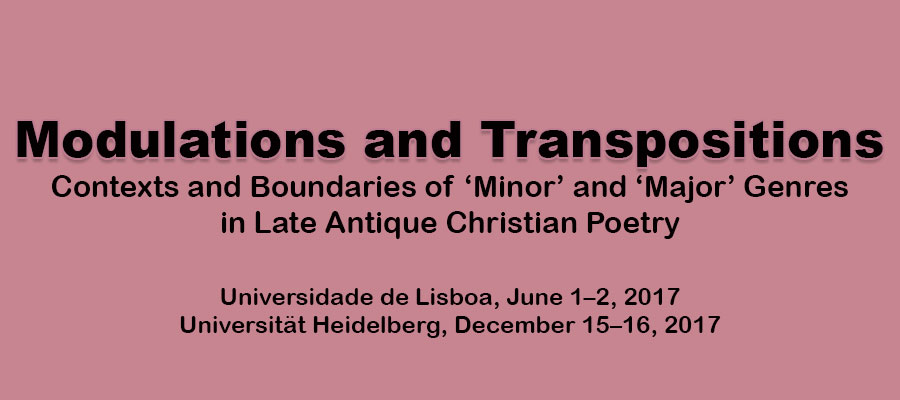Modulations and Transpositions: The Contexts and Boundaries of ‘Minor’ and ‘Major’ Genres in Late Antique Christian Poetry, Universidade de Lisboa & Universität Heidelberg, June 1–2, 2017 & December 15–16, 2017
This is a CFP for a two-part workshop on Christian late antique poetry organized by F. Hadjittofi and A. Lefteratou. The workshop will take place in two installments, in Lisbon in June 2017, and in Heidelberg in December 2017. The publication of a proceedings volume will depend on the quality and coherence of the presentations.
The aim of the workshop is to explore the impact and transformation of classical forms and genres in the Christian poetry of the 4th – 6th centuries CE. We hope to cover both Greek and Latin Christian poetry, and possibly other, classicizing late antique poems, for which the influence of Christian forms or genres can be demonstrated (see, for example, the transformation of tragedy into moralizing, quasi-Christian apologetic epic in Dracontius’ Medea and Orestis tragoedia). As a rough guide, the Lisbon event will deal with small-scale forms (e.g. epigrams, epyllia, and hymns), while the Heidelberg part will concentrate on larger-scale forms (e.g. epic and tragedy).
In music, ‘modulation’ is used to describe the process of changing between the major and the minor keys, while ‘transposition’ is the rewriting of a whole piece onto another key. This might be a good metaphor for thinking about how the Christian poetry of late antiquity breaks free from traditional systems of generic classification. However, just as music keys have a particular mood in them, often culturally constructed, genres too are not only stylistically and thematically defined but their re-construction and reception also depends largely on their cultural milieu.
Eudocia’s hexameter poem on St. Cyprian, for example, could be seen as both a ‘transposition’, in that it renders a prose hagiographical account into heroic hexameters, but also a ‘modulation’ of several ‘major’ genres, with echoes from the Homeric epics, the novel, and philosophical biographies such as Philostratus’ Life of Apollonios. In this case, how does the medium, heroic hexameters, influence the reception of the other, non-hexametrical genres in it? To what degree can epic become yet another form of the Philosophenroman? How easily can a poem like this (as well as other, ‘new’ epic forms, such as the cento, the paraphrase, and allegorical epic) fit under the traditional rubric of ‘epic’, and with what kinds of expectations would its readers approach it, if they did classify it as ‘epic poetry’?
The workshop will attempt to tackle and disentangle, to the degree that this is possible, (some of) the following questions:
- Does the metre or genre in which a Christian poem is written influence its reception or interpretation? Do classical genres and metres still evoke an ethos? For example, are iambic metres still associated with invective? How do the various metres of the different poems in Prudentius’ Peristephanon influence our assessment of each poem’s tone and generic affiliation? How are Christian hymns written in hexameters (e.g. Prudentius’ Hymn on the Trinity) different from those written in more unusual metres (e.g. Synesius’ Hymns or the so-called Oxyrhynchus hymn [P. Oxy. XV 1786])?
- Were large-scale compositions thought to be more suitable for public performance? Can we detect a connection between genre and the rituals to which these texts may allude? Do small-scale forms and genres suggest a more private or bookish context?
- How do the various genres and sub-genres of Christian prose (Gospel, Apocalypsis, homilies, hagiographies, passion narratives) inform the genres of Christian poetry? Do some of these give rise to new genres? How are they identified and received when integrated inside other genres? Are some perceived as more serious or ‘grand’, and perhaps ‘transposed’ more regularly into epic; conversely, do others provide more liberty in the choice of both metre and content?
- How are the various stylistic techniques learned in the schools of rhetoric (e.g. prosopopoieia, ekphrasis, encomium) ‘modulated’ when incorporated into Christian poetry? Does their employment within larger- or smaller-scale forms make a difference in how they are received?
- When Aratus set the scientific treatise of Eudoxus into verse, he was creating poetry ‘in the second degree’ (Genette [1997] Palimpsests: Literature in the Second Degree). Do poetic paraphrases of Christian texts work within the same, Hellenistic tradition, and to what extent do Christian poets seem to be aware of this?
